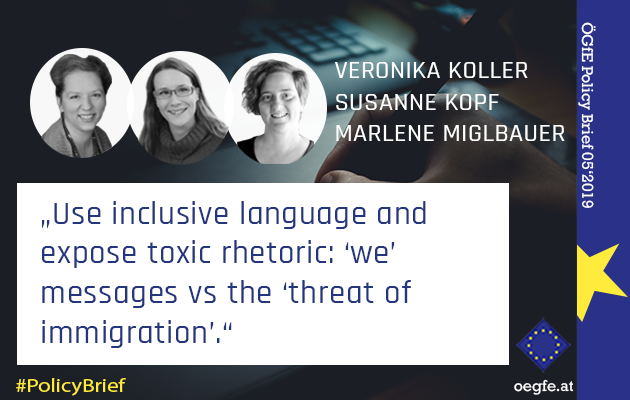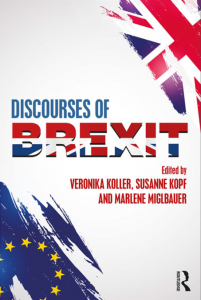Policy Recommendations
- Use inclusive language and expose toxic rhetoric: ‘we’ messages vs the ‘threat of immigration’
- Facilitate interaction among EU citizens across member states
- Promote exchanges between EU decision makers and citizens
Abstract
The edited volume ‘Discourses of Brexit’ consists of 13 studies dealing with the language used in connection with Brexit. That is, it contains studies that assesses politicians’, the media’s but also ordinary citizens’ language use from before the 2016 referendum on the UK’s EU membership to after the UK’s invocation of article 50 in 2017. Drawing on a variety of data and using various methods of linguistic and textual analysis allows a holistic understanding of various views on Brexit, the European Union and related matters. One of the key findings reflected across party lines is that the UK is discussed as separate from the EU, with the Union described as rather deficient. What is more, policy makers’ and news media’s linguistic framing of Brexit, the EU and the UK’s relationship with the Union are echoed by Leave voters, which suggests a likely influence on the referendum outcome.
****************************
Talking about Brexit – voices from before and after the referendum
A kaleidoscope of voices
The edited volume “Discourses of Brexit” is the first comprehensive exploration of discourses and language surrounding the United Kingdom’s departure from the European Union and as such a step towards understanding the reasons for, and processes of, Brexit. It covers multiple facets of the phenomenon and provides a kaleidoscopic view on various aspects of the language used around Brexit.
The book consists of 13 chapters which present insights from both Leave and Remain campaigns and their representatives during the run-up to the EU referendum in 2016. The contributions also cover its immediate and extended aftermath, from the UK government’s decision to trigger Article 50 to a time when the exit negotiations were well underway.
This edited volume presents a holistic investigation of Brexit and provides insights into the drivers and consequences of the EU membership referendum from a linguistic point of view.
The individual authors draw on a variety of data from as far back as 2012 to early 2018 for their analyses: British parliamentary debates, TV debates, comments and letters from EU representatives, public speeches by Nigel Farage, Jeremy Corbyn, Theresa May and Boris Johnson, official government documents, news coverage, interviews with citizens, wikipedia discussions, tweets, and language itself, such as proverbs and new words connected with Brexit. The book provides an insight into how a plethora of voices in various contexts and multiple public spheres have made sense of Brexit and Brexit-related matters. Further, the book’s multifaceted perspective is exemplified by the wide array of methodological approaches, ranging from traditionally quantitative methods, such as corpus linguistic analyses, to fine-grained qualitative analysis, for example multimodal analyses.
This edited volume presents a holistic investigation of Brexit and provides insights into the drivers and consequences of the EU membership referendum from a linguistic point of view.
What we found
Following a tradition from at least the 1980s onwards, British politicians distinguish between ‘we’ and ‘the EU’ or ‘Europe’, and claim that Britain is both different and exceptional.
While the chapters in the book address the language used by politicians, citizens and the media when talking about Brexit, we will here focus on the first two groups.
Following a tradition from at least the 1980s onwards, British politicians distinguish between ‘we’ and ‘the EU’ or ‘Europe’, and claim that Britain is both different and exceptional. In doing so, politicians from very different parties sound strikingly alike in their Euroscepticism, as witnessed by these three quotes:
“The fact is we just don’t belong in the European Union. Britain is different.” (Nigel Farage, address to the 2013 UKIP party conference)
“We have the character of an island nation … we come to the European Union with a frame of mind that is more practical than emotional.” (David Cameron, 2013 speech at Bloomberg news company)
“Europe can and must do far more to meet the needs of our people.” (Jeremy Corbyn, 2016 speech at the Institute of Engineering Technology)
The same kind of detachment from the EU also showed in the Leave and Remain campaigns, both of which represented the EU as deficient. While Leave campaigners also talked about the EU as disempowering the British people and as facilitating the perceived threat of immigration, Remain supporters across party lines used a particular formula to argue their case:
“This organisation is imperfect and can sometimes be frustrating, but we are better off in it.” (Conservative Prime Minister David Cameron in the House of Commons, 2016)
“Europe’s not perfect … But we still get a better deal if we work together.” (Labour MP Yvette Cooper in a Daily Mirror article, 2016)
After the referendum in June 2016, officeholders in Britain became keen to avoid taking any blame for Brexit. They did so by minimising the perceived agency of the government, downplaying possible negative effects of leaving the single market and customs union, and presenting themselves and the British people in a positive light while throwing a negative light on the EU.
The topics and emotions advanced by the Leave campaign – sovereignty and immigration, pride and fear – were very much echoed by Leave voters both online and offline, suggesting a likely influence on the referendum outcome. Remain voters took to Twitter after the vote, amplifying difficult emotions such as sadness in particular:
“This is so sad. #Brexit”
“The consistent emotion for me through all the coverage: sadness. #Brexit”
“Me right now #Brexit [picture of a person in tears]”
Individuals who discussed Brexit on Wikipedia highlighted immigration to the UK as the chief reason for the outcome of the Referendum and discussed potential negative effects on the economy. While also rather pessimistic, those citizens engaged in argument and debate rather than expressing their feelings, demonstrating that different social media platforms serve different functions.
After the referendum, officeholders used language to further deepen such detachment, while citizens took to social media – and more recently also to the streets – to express their emotions and argue about what would and should happen next.
The findings overall show that British politicians of all stripes tend to see and discuss their country as separate from the EU and that even Remain campaigners failed to make a positive case for EU membership. The topics and emotions proffered by both campaigns were echoed by voters online and offline. After the referendum, officeholders used language to further deepen such detachment, while citizens took to social media – and more recently also to the streets – to express their emotions and argue about what would and should happen next.
Where do we go from here? Our recommendations
The polarising linguistic behaviour observed perpetuated a climate of distrust and division after the referendum and continues to impact the UK’s stance towards the European Union.
We have seen that, in the United Kingdom in particular, Brexit has been negotiated in terms of us vs them, we against the threatening ‘Other’ across media and genres, across party lines and time. This language of opposition contributed to the referendum’s unexpected outcome. What is more, the polarising linguistic behaviour observed perpetuated a climate of distrust and division after the referendum and continues to impact the UK’s stance towards the European Union.
On the basis of our findings, we propose several steps to mitigate and over time hopefully reverse the detrimental effects of the rhetoric surrounding Brexit. What is more, while the 13 studies published in ‘Discourses of Brexit’ focus on the language use around the UK’s decision to leave the EU, we observe similar problematic linguistic behaviour outside of the UK as well. Therefore, the following recommendations ought to be implemented across various contexts and certainly not only in the UK.
- Use inclusive language: Irrespective of our role and position in society, we can counteract the prevalent discourse of us vs them by consistently using an inclusive ‘we’ beyond the nation state and, connected to this, sending messages that aim to elicit positive emotions in an audience (e.g. “Europe is us, just as we are in Europe, because it is impossible to think about our destiny as a continent other than in terms of the European project”, French president E. Macron, July 2017). That is, establish a form of in-group that is not primarily defined against a ‘Feindbild’, i.e. against a threatening ‘Other’ consisting of the EU or particular social groups.
- Expose toxic rhetoric: Beyond using inclusive messages ourselves, we ought to draw attention to problematic linguistic behaviour in our environment. As individuals, we may educate ourselves about language in order to develop our ability to identify the use of toxic rhetoric and thus mitigate its impact on us. As policy makers and public figures, we should explicitly call out questionable linguistic behaviour (e.g. “See the young Muslim criminals […] This kind of evil might not have reached us yet, but it is well in sight. And there is no-one in Brussels who can protect us when it comes”, then UKIP leader N. Farage, 2016). As teachers, we can educate our students to be able to identify rhetorical strategies employed in various contexts, reaching from news media reporting to social media usage or political communication. As news media representatives, we may also educate our audience, e.g. by introducing a weekly column that deals with rhetorical strategies and linguistic manipulation using examples from daily (political) life.
- Facilitate interaction and debate across national borders: In addition to linguistically establishing a collective and inclusive ‘we’ identity beyond the nation state, it is important to open up spaces for debate across citizens of the EU to strengthen this collective identity. Some concrete steps that may be taken to create such spaces where citizens from various national backgrounds may meet to exchange and possibly align opinions are: creating online platforms for transnational debate on who we as a European society wish to be, organising student or employee exchanges and establishing co-operations on any level across national borders (e.g. city or school partnerships).
- Foster exchange between EU policy makers and citizens: Another effective means to drive home the message that the EU is not a remote and threatening ‘Other’ is to bridge the gap between policy makers and citizens. Concrete steps to be taken are: hold, and spread the word about, regular town hall meetings, especially outside metropolitan areas, that allow ordinary citizens to connect with EU policy makers (here, it is important to encourage interaction and not merely top-down presentations), set up online platforms that boost contact between citizens and policy makers, organise trips to EU institutions.
Discourses of Brexit (edited by V. Koller, S. Kopf & M. Miglbauer) was published with Routledge on 4 March 2019.
https://www.routledge.com/Discourses-of-Brexit/Koller-Kopf-Miglbauer/p/book/9781138485556
ISSN 2305-2635
The views expressed in this publication are those of the authors and not necessarily those of the Austrian Society of European Politics or the organisation for which the authors are working.
Keywords
Brexit, language use, politicians, citizens
Citation
Koller, V., Kopf, S., Miglbauer, M. (2019). Talking about Brexit – voices from before and after the referendum. Vienna. ÖGfE Policy Brief, 05’2019










